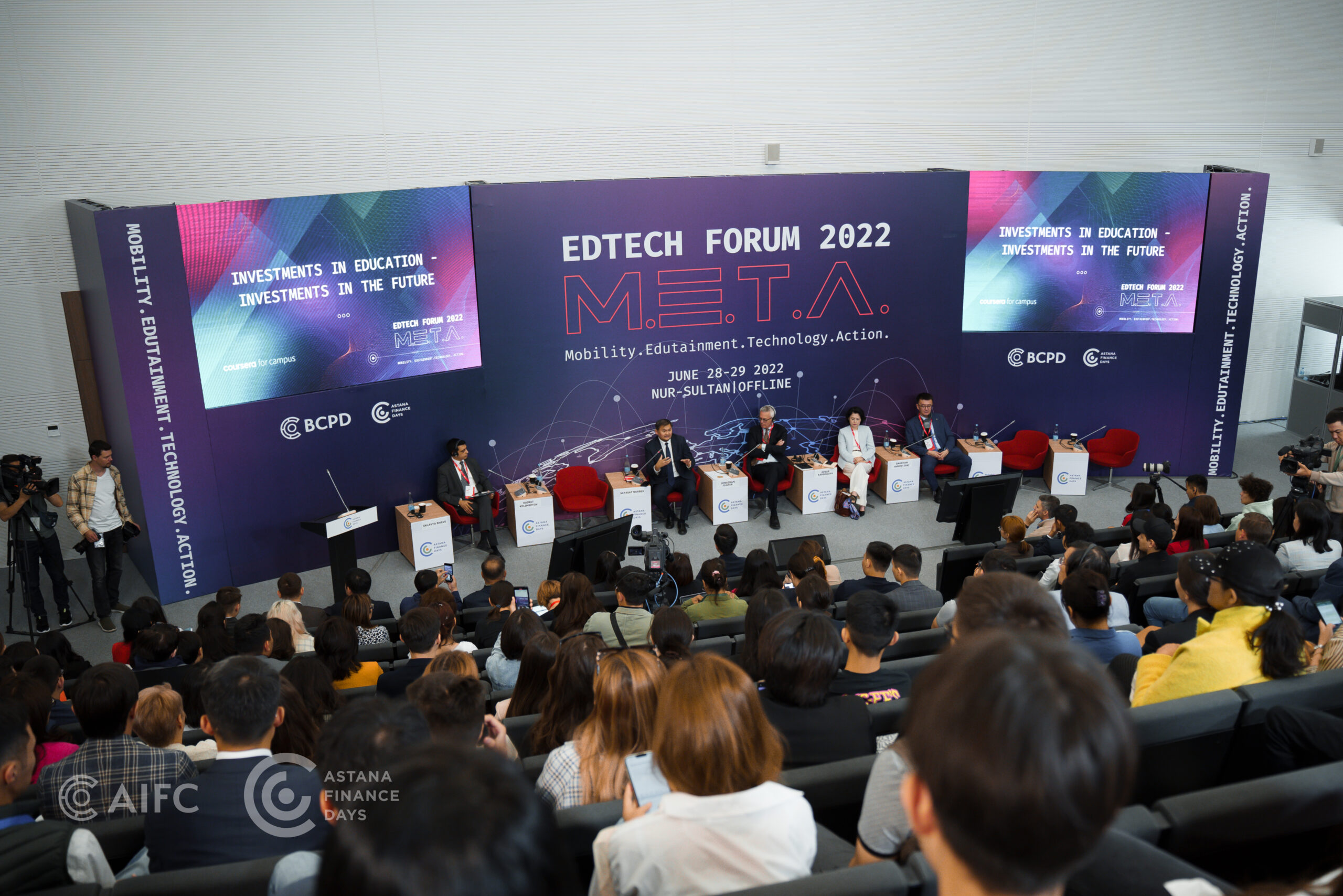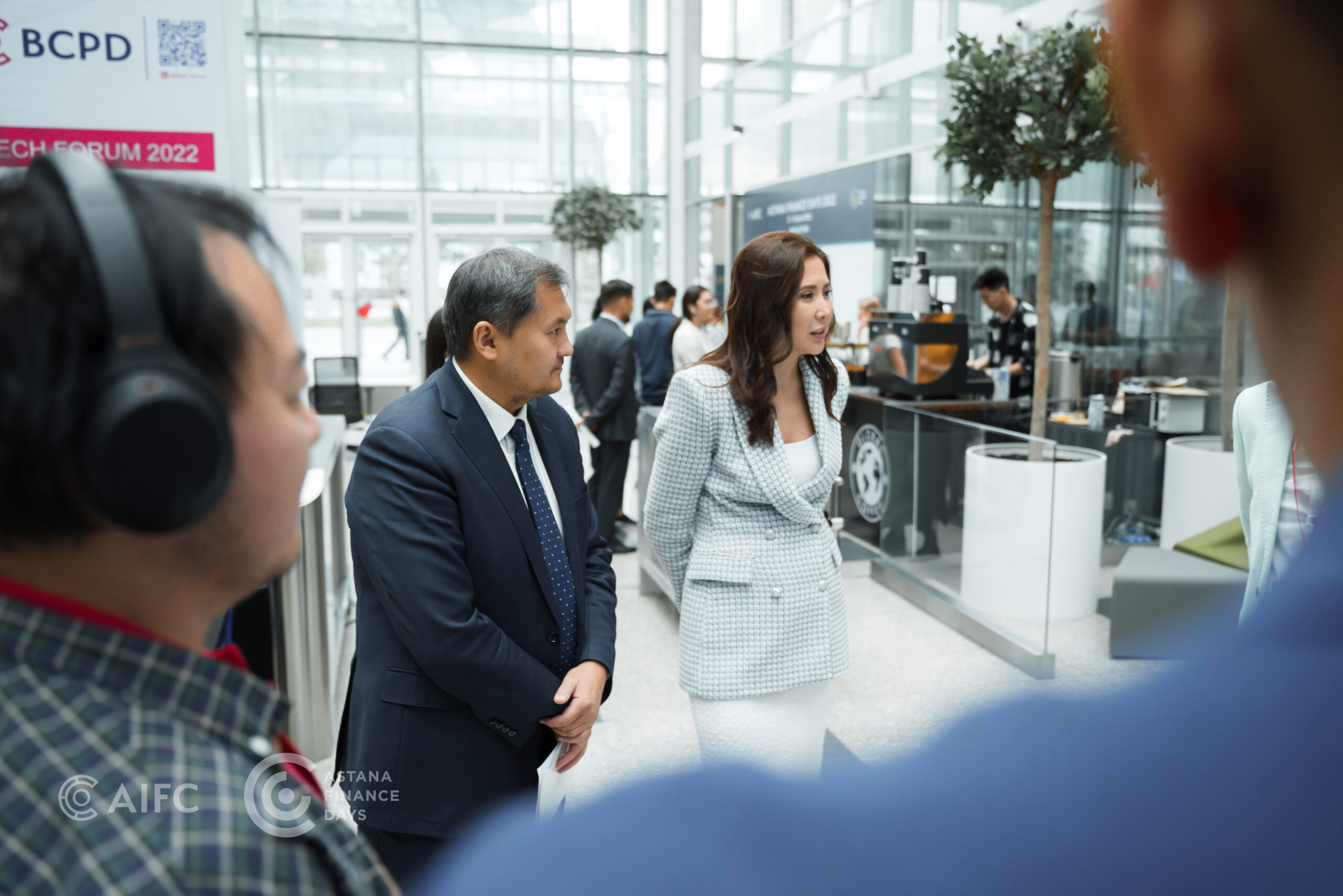NUR-SULTAN – This year, the fourth International Forum of Educational Technologies in Nur-Sultan held two major sessions to address issues related to human capital development and the digital agenda in education.

The EdTech Forum was held on June 27-29. The key theme of the forum was M.E.T.A. (Mobility. Edutainment. Technology. Action).
The EdTech Forum was held on June 27-29. The key theme of the forum was M.E.T.A. (Mobility. Edutainment. Technology. Action.).
During the session dedicated to the investments in education, Minister of Science and Higher Education Sayasat Nurbek said that it is necessary for universities to develop digitalization and educational technologies, and collaborate with major international partners.
“In our country, I think the higher educational institutions are facing three big issues,” said Nurbek. “First, we see an increased competition… We see big platforms like Coursera providing educational services on the market. The big techs like Google, and Microsoft have joined this race. In the past, we had an education which was qualified, certified and it was mostly provided through universities or vocational schools. Now we see that other non-classical schools have joined that race.”
Second, higher education faces the limits of infrastructure. While the big tech companies provide informal educational opportunities for millions of people, universities now can enroll only a certain number of people. The pandemic has been a catalyzer of this trend.
The landscape of the labor market is rapidly changing. This causes a real challenge for educational institutions. To close the gap between industries and academia, there is a need to create flexible curricula and programs.
The minister also supports the promotion of academic autonomy. He recommended implementing self-regulating universities that can adapt to the changing workforce landscape and find solutions quickly.
The opening of prestigious university branches following the University of Arizona and the first British University campus in Kazakhstan of De Montfort University will improve competition in education.
Strategic advisor and public service reformer Jonathan Slater emphasized that a combination of literacy, numeracy, and digital skills is fundamental for improving the education system.
“We have done an analysis in England that looks at the mathematical abilities of young people and compares how much money they earn on the basis of how well they did in mathematics at school. There is a strong correlation. The better you do at mathematics, the more economic potential you have as an individual,” said Slater.
The basic numeracy of all young people has become a fundamental part of the reform in the United Kingdom in the last 20 years.
In regard to employment, basic digital skills are essential for employers but more than that, they need soft skills. “They want creativity. They want teamwork. They want people who listen to each other. They want people who are kind to each other and can work together,” Slater said.
The main difference between a human being and a machine is the ability to empathize, added Slater.
The influence of technologies and innovations on the learning process was on the agenda of the Mobility. Edutainment. Technology. Action session.
According to CEO of the AIFC’s Bureau for Continuing Professional Development (BCPD), TechWoman Elmira Obry, the formats, and opportunities of learning are becoming almost limitless with the help of new technologies. The digital agenda expands the boundaries for creativity and brings new solutions to improve education.

Minister of Science and Higher Education Sayasat Nurbek and CEO of the AIFC’s Bureau for Continuing Professional Development (BCPD), TechWoman Elmira Obry visit the exhibition at the forum.
Kazakhstan’s robotics should become one of the brands of the nation in the future, said Director of Robotics School Sanzhar Shalkarbekov. Talented children will contribute to this. The quality of education is necessary to implement this initiative. Teachers who are genuinely interested in this direction should also be involved in the learning process.
The Robotics School has been currently working on methodological materials that will be distributed to rural areas. The books will help teachers to add robotics classes to the educational process.
Director of Bilim Media Group Rauan Kenzhekhanuly spoke about the importance of training talented specialists with the help of new technologies.
Kenzhekhanuly is one of the founders of the EdTech industry in Kazakhstan. His company was initially involved in the informatization of education. When the company was founded 10 years ago, there was no concept of EdTech at all.
“Our task was quite simple. We helped teachers to integrate new technologies into educational content. Now, we have a team of more than 200 people, and our projects are presented in schools in Kazakhstan and Uzbekistan,” said Kenzhekhanuly.
The expert noted that the Kazakh legislation does not yet contain the concept of distance learning. There are no requirements for either platforms or content. This issue should also be addressed. The content, methodology, and educational process remain the most important issue.

